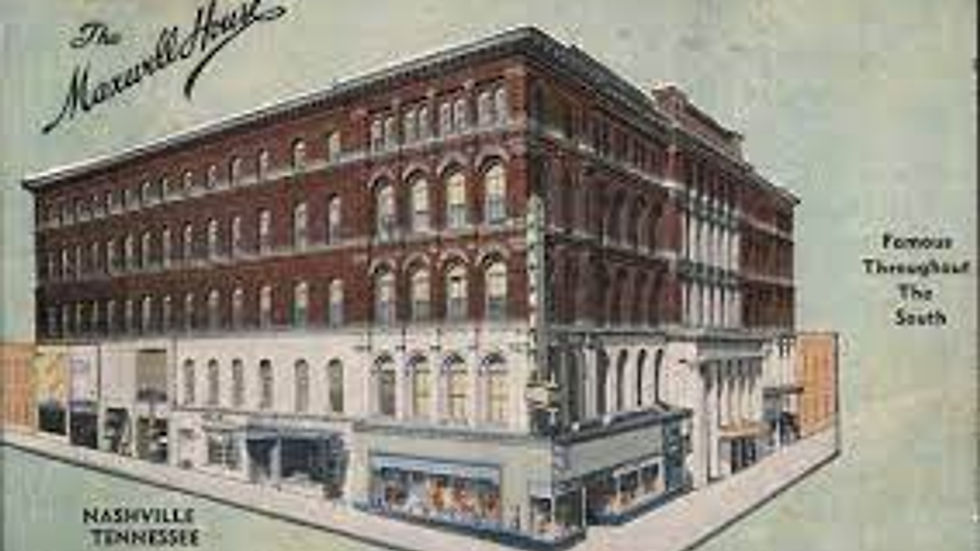5 Things You Didn’t Know About the History of Broadway in Nashville
- Paul Whitten

- May 7, 2025
- 3 min read
Updated: Nov 8, 2025
Unlocking the Secrets Behind Honky-Tonks, Heroes, and Hidden History of Music City’s Most Famous Street

When most people think of Broadway in Nashville, they picture neon lights and live music pouring from every window. They envision a parade of cowboy boots heading for the nearest rooftop bar. And hey—you're not wrong!
But behind the bright lights and party vibes is a street steeped in unexpected history. Whether you're a first-timer or a repeat visitor, here are 5 Fun Facts About Nashville Broadway History that might just surprise you—and give you a little more reason to look up from your drink the next time you're downtown.
1. It Wasn’t Always Called Broadway
Broadway was originally known as “Broad Street” until 1904. This name change was part of a citywide modernization effort. Before the honky-tonks moved in, Broadway was a hub for shipping and industry. It was known for more than just entertainment—there were also brothels. Even back then, Broadway knew how to keep things spicy.
2. The Ryman Wasn’t Built for Country Music
Just off Broadway sits the Ryman Auditorium, known as the Mother Church of Country Music. But when it was built in 1892, it was literally a church. Designed by riverboat captain Thomas Ryman, it was intended for gospel revival services. Over time, the Ryman became a stage for legends like Johnny Cash, Elvis, and Dolly Parton.
So technically, your bachelorette pregame happens just steps away from sacred ground.

3. It Was Home to the Nation’s First Air-Conditioned Hotel
Downtown Nashville once hosted the grand Maxwell House Hotel. It is famous for President Teddy Roosevelt supposedly coining the phrase “Good to the last drop” after enjoying the hotel's signature coffee. Not only that, it was one of the first hotels in the U.S. to feature central air conditioning. Sadly, the original building was demolished in the 1960s. Its legacy, and the coffee brand, still live on today.
The site is now near where today’s Broadway nightlife unfolds—less cigars and spittoons, more frozen cocktails and boots with fringe.

4. A Civil Rights Battle Took Place on Broadway
In 1960, local students launched peaceful sit-ins at the Woolworth's lunch counter, just off Broadway. These sit-ins became a significant moment in the Civil Rights Movement. They played a crucial role in helping to desegregate lunch counters throughout the South.
Today, the site is commemorated with a plaque, serving as a reminder that Broadway’s history isn’t just musical, but deeply meaningful.
5. Not All Legends Played the Big Stages First
Think country stars got their break on massive stages? Think again! Artists like Chris Stapleton, Kacey Musgraves, and Garth Brooks all performed at tiny Broadway bars long before they found fame. It’s not uncommon to stumble into a dive bar and hear someone who might be headlining Bridgestone Arena next year.
If your bartender is also your live entertainment, make sure to leave a big tip. You just might be tipping a future Grammy winner!
🎤 Walk the Street: Hear the Stories About Nashville Broadway History
History isn’t behind glass; it’s on the streets. No street in Nashville tells a more entertaining story than Broadway. That’s why we walk it.
Join us for a Broadway Walking Tour with Nashville Adventures. Discover all the amazing history that makes Music City great. We mix music, scandal, civil rights, architecture, and whiskey-soaked tales into one unforgettable experience.
TLDR:
FAQ – Broadway’s Hidden History
When did Nashville’s Broadway become famous for music?Broadway gained national fame in the mid-20th century when honky-tonks, record labels, and the Grand Ole Opry brought musicians downtown.
Was Broadway always called Broadway?No, it was originally Broad Street before being renamed Broadway in the 1800s as the city expanded.
What was Broadway like during the Civil War?Union soldiers marched through this very street after the Battle of Nashville, and several historic buildings still date to that period.
Are there original buildings from early Nashville left?Yes, Tootsie’s, Merchants, and several brick facades trace their foundations to 19th-century Nashville.
Can I take a Nashville Adventures tour that covers Broadway’s history?Yes! Nashville Adventures offers the Stories on the Streets tour, which includes Broadway’s early days and its transformation into Music City.



